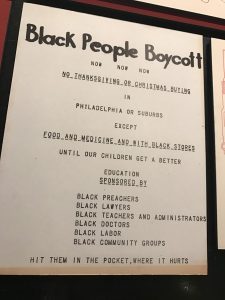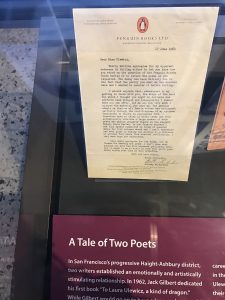Power of language
My experience visiting the Beat Exhibit is intriguing. Among all the artifacts in the exhibit, two of the artifacts are particularly interesting to me. One is the propaganda ‘Black People Boycott’ and the other is a letter. Although the two artifacts display different focuses of the Beat generation, they are similar because both employ the power of language.
I will start with discussing the propaganda. The aim of the propaganda ‘Black People Boycott’ is to convince and urge the government to enrich the African-American population by providing them more education opportunities. The opening of the propaganda ‘Now Now Now’ immediately builds up a tone not only authoritatively didactic, but also an immediate urgency. The author then makes a juxtaposition between ‘Christmas and ‘Thanksgiving buying’ among American middle/high class society and ‘food and medicine’ in Philadelphia or suburbs. Christmas and Thanksgiving shopping represents American consumerism and capitalism—they are leisure activities which people do during holiday seasons. On the contrary, ‘food’ and ‘medicine’ are necessities for living. By indicating a ’No’ in front of holiday shopping, the author effectively denounces government’s ignorance, as it only cares to promote unnecessary bourgeois shopping but forgets what really matters: survival of low-class society. The action oriented verb ‘hit’ at the beginning of the last line parallels with the word ‘hurts’ in the end, which again effectively indicates the problem among black population: insufficient funds for education. I find this propaganda really effective in terms of promoting government action. Moreover, the use of word ‘hurts’ and the juxtaposition between the lives of middle to high class Americans and the black population consequently evoke a feeling of guilt/shame. Overall, the author’s usage of language and literary technique are really effective and powerful in promoting actions.

Another artifact is Richardson’s let to Laura Ulewicz. this is a letter about Ulewicz work being included in Penguin poetry anthology. However, Laura Ulewiz’s work did not make to publication because the editors concluded that a volume featuring female writers would not be sufficiently profitable. An offensive rejection to the female writers, it must be hard for Richardson to tell Laura Ulewicz that the rejection of her writings was merely because of her gender. However, Richardson still manages to deliver his implicit message considerably yet effectively to Laura without sounding offensive. The letter begins with using a numerical hyperbole ‘thirty million apologies’ which quantifies his feeling of guilt and apology for failing to respond her question within suitable time frame. The hyperbole effectively conveys Richardson’s guilt, and displays his full respect to Ulewicz. Richardson then states that he has to reject Ulewiz writing, but tried his best to accommodate the language so it sounds less offensive. He first generalizes the rejection, indicating that ‘all female volume has collapsed’, implying that it is not due to Ulewiz poor personal performance. He then indicates that he has to think in ‘mixed terms’, which involves a ‘larger’ number of male writers in the Penguine series. The words ‘mix’ and ‘larger’ are all terms which show some degree of inclusiveness. ‘Mix’ suggests a diverse state which involves two genders: although the proportions of male and female writers was not stated, he does imply that the writers they selected were a mixture of both genders. Similarly, the word ‘larger’ also indicates that he does not completely ignore them, thereby showing his respect to women and his efforts of being inclusive. What I want to argue is, although the basis of the rejection is offensive to female gender, Richardson makes the rejection sounds much less offensive and acceptable by his employment of language.

The two artifacts make me in awe of how powerful language could be. From the propaganda ‘Black People Boycott’, we get a glimpse of how language is a powerful tool in exposing the ugliness and ignorance and cruelty of inequality. Yet, from the letter, we sense that language is equally powerful in disguising/undermining the potential discomforts fostered by inequality.
